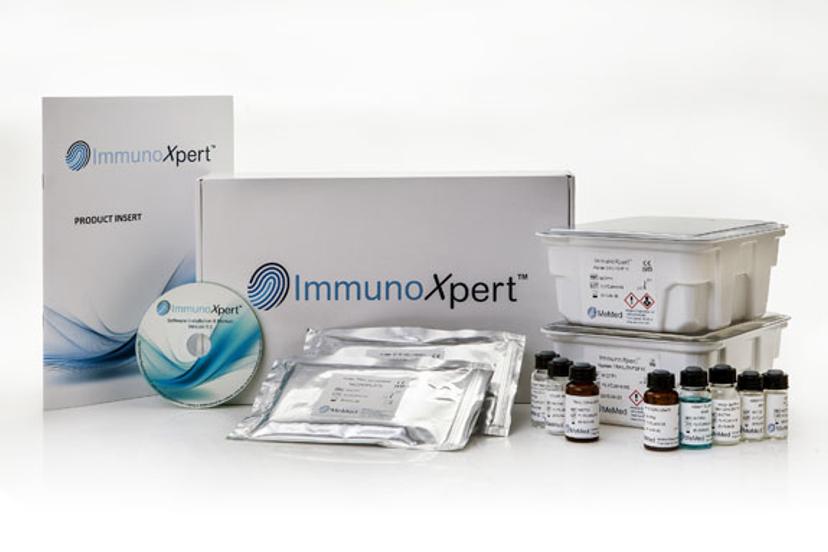New Infectious Disease Assay Could Improve Patient Management and Reduce Antibiotic Resistance
ImmunoXpert™ blood test uses novel technology to accurately distinguish between bacterial and viral infections
8 Sept 2015

MeMed Co-Founders Dr Eran Eden (left) and Dr Kfir Oved
About MeMed Dr Eran Eden, CEO, and Dr Kfir Oved, CTO, co-founded MeMed in 2009. MeMed is passionate about improving patient healthcare through research, development and commercialization of pioneering diagnostic solutions for inflammatory and infectious diseases.
MeMed recently announced publication of the results of a large multicenter prospective clinical study that validates the ability of its ImmunoXpert™ in vitro diagnostic blood test to determine whether a patient has an acute bacterial or viral infection. Sonia Nicholas, SelectScience's Clinical Editor, spoke to MeMed co-founder, Eran Eden, to find out more.
SN: What are the current problems involved in pathogen screening in acute care settings?
EE: Let's take the example of a sick child who arrives to see the clinician with a fever and a suspected acute infection. The clinician needs to decide whether the infection is viral or bacterial, and whether to treat the patient with antibiotics or not.
There are platforms on the market that are designed to help physicians make informed decisions about how to treat patients like this. But these platforms do have limitations:
- Prolonged time to results, usually 24-48 hrs.
- Diagnosis of accessible pathogens only – the tests available currently require access to the site of infection. It is very difficult to apply a PCR or rapid test to an unknown or inaccessible infection site.
- False alarms due to natural flora colonization – it is known that there is a large number of bacteria and viruses in and on the body that do not cause a clinical problem. These microorganisms can cause false alarms by giving positive screening results, despite not being the cause of the patients illness.
ImmunoXpert overcomes these limitations because rather than trying to detect the DNA of the virus or bacteria, it identifies markers in the patient's immune response.
SN: Can you tell us more about how ImmunoXpert works?
EE: The ImmunoXpert assay is the result of many years of research. As a company, we have assessed and analyzed 600 infection response proteins from real world clinical samples to determine their individual ability to identify viral infections. As a result of this, the largest proteomic screen ever conducted, we managed to lock down a sub-set of highly informative biomarkers.
The most informative protein that we found is called tumor necrosis factor (TNF)-related apoptosis-inducing ligand (TRAIL). This protein has the unique property of dramatically increasing in the blood of patients infected with a viral infection, but crucially, levels go down in patients with a bacterial infection.
While highly informative, TRAIL on its own isn't a perfect indicator of viral or bacterial infection. However, when we combine measurement of this protein in a panel with two other immune proteins, C-reactive protein (CRP) and IP-10, we can generate a unique immune signature for each patient. Using an internally developed algorithm, we are then able to computationally diagnose the cause of infection with a high degree of accuracy.

ImmunoXpert™ is a pioneering in vitro diagnostic test that accurately distinguishes between bacterial and viral infections, based on the patient’s immune response
SN: What is the advantage of using this assay?
EE: Because we are looking at the patient's immune response, rather than the presence of viral or bacterial DNA, ImmunoXpert elegantly solves the limitations of traditional and molecular assays. We can measure proteins quickly without the risk of false alarms due to colonization of natural flora. We also don't need to be able to access the site of pathogen infection.
SN: What is the benefit to the patient of using this assay?
EE: This assay can be used at triage to determine, with a high level of accuracy, whether the patient is infected with a virus or a bacteria. This is vital in helping the physician to determine the correct treatment response.
We are all aware of the problems arising from the over-prescribing of antibiotics and the rise of antibiotic resistance. What a lot of people don't realise is that under-prescription of antibiotics is also an issue – one in five patients that needs antibiotics isn't being given them. The only way to tackle this problem is to determine whether a patient is suffering from a bacterial infection, and then to make a treatment decision based on this result. ImmunoXpert helps physicians to do this with a high degree of confidence.
This assay has an extremely high level of utility and is superior to any other platform available on the market.
SN: Is this a laboratory or point-of-care test?
EE: ImmunoXpert is a microplate ELISA test designed to be run in the laboratory. It can either be run manually, or it can be mounted on a multi-purpose, automated ELISA system. The assay can provide a result in two hours.
We do have a platform in development, ImmunoPoC™, that will allow the test to be run at the point of need.
SN: Can hospitals use this test now?
EE: The assay is CE-IVD certified and we are currently running an early access program, which selected hospitals in the EU can take part in. We are working very closely with the sites involved in this program prior to the official release of the assay. Our intention is to bring the assay to the global market, since of course bacteria don't respect borders.
MeMed recent news:
MeMed Awarded €3M from the European Commission in High Profile Business Competition
New Clinical Study Shows MeMed's IMMUNOXPERTTM Blood Test Can Accurately Distinguish between Bacterial and Viral Infections
